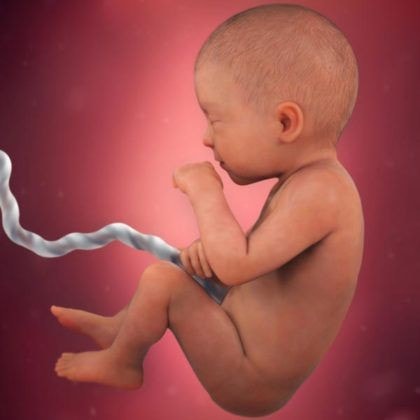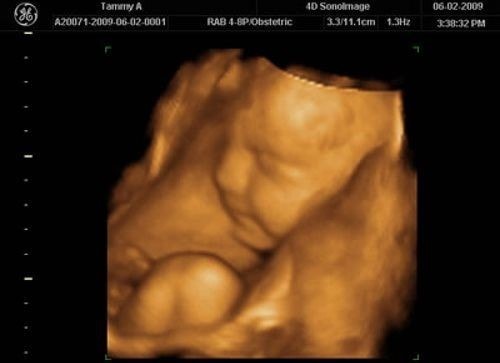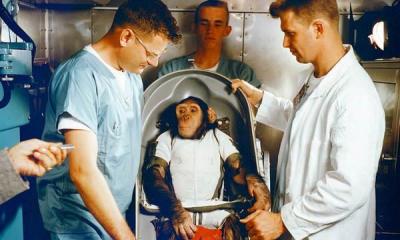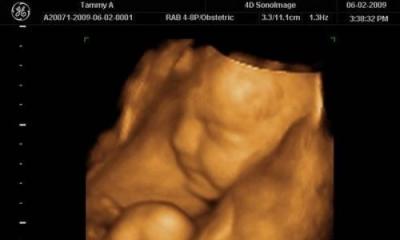There is less and less time left before childbirth. At 31 weeks of pregnancy, it is worth attending special lectures to teach how to behave during childbirth. It is also important to visit a gynecologist in a timely manner and take tests in order to identify possible pathologies in time.
He is actively gaining muscle mass, his weight reaches about 1.6 kg, height can vary from 39 to 42 cm. The kid has learned to suck his finger.
His brain continues to develop actively. The nerve fibers are already protected by a special sheath, and the child can transmit impulses much faster.
He is already capable of learning. Starting this week, the pupils of the fetus are almost the same as those of an adult, they already react to light and darkness.
His skin turns pink, under it adipose tissue of the white type is deposited.
He can already feel pain, so if you accidentally press on the stomach more than usual, the child will immediately react with active movement.
As soon as the 31st week of pregnancy begins, the fetus becomes much more receptive to environmental signals. He shudders from sharp sounds and fright, he may hiccup. At this time, he hears the voice of his parents well and perceives the lullabies that they sing to him.
 In the fetus, the mass of the pancreas increases. She is almost ready to produce enzymes responsible for the breakdown of proteins, lipids and carbohydrates. But they will be needed after the birth of a newborn. At 31 weeks, the pancreas produces insulin and maintains normal glucose levels in the fetal body.
In the fetus, the mass of the pancreas increases. She is almost ready to produce enzymes responsible for the breakdown of proteins, lipids and carbohydrates. But they will be needed after the birth of a newborn. At 31 weeks, the pancreas produces insulin and maintains normal glucose levels in the fetal body.
The liver also continues to develop, the formation of cells that are responsible for cleansing the blood of harmful substances ends.
The kidneys of the fetus function well, they excrete urine into the amniotic fluid.
At this gestational age, fetal movements are needed for the development of the muscles of the limbs. He periodically makes chaotic movements with his legs and arms, which are noticeable to others.
What's going on with mom
As a rule, at this time a woman may notice that colostrum, which is a thick brackish liquid, is secreted from her mammary glands. It contains many useful substances that a newborn needs during the first days of life. Over time, it will be replaced by mother's milk. Colostrum secretion is regulated by prolactin, the production of which is activated by hormones synthesized by the fetal adrenal glands.
The weight of a woman continues to grow, from the moment of conception, her body weight can increase by 9.5-10.5 kg. Normal weight gain per week is 300 grams. When it is more, it is worth checking your daily diuresis. It is necessary to calculate the amount of fluid drunk and excreted in the urine. When this result is positive, then everything is in order. If diuresis is negative, then, despite the fact that there are no visible edema, most likely the fluid is retained in the body. In this case, you should pay attention to your diet: exclude all spicy, salty, fatty and fried foods from the menu.
Reduce the intake of sodium ions, which retain water in the body. They are contained in table salt, so it is advisable not to add salt to food.
Also, do not use baking soda to eliminate heartburn. And, of course, with the appearance of edema, it is worth informing the attending physician about this, since they are one of the symptoms of late toxicosis called preeclampsia. The risk of its occurrence increases if a woman has:
- excess weight;
- high blood pressure;
- multiple pregnancy;
- pathology of the heart and kidneys;
- age over 30 years old.
 In severe cases, preeclampsia can cause convulsions, fainting, death of a pregnant woman. Therefore, you should not deceive the doctor about your condition and it is important to take urine for tests on time. This will prevent the occurrence of dangerous complications.
In severe cases, preeclampsia can cause convulsions, fainting, death of a pregnant woman. Therefore, you should not deceive the doctor about your condition and it is important to take urine for tests on time. This will prevent the occurrence of dangerous complications.
At this time, the uterus strongly protrudes forward and rises above the pubic symphysis by more than 30 cm. Almost all women experience back pain, as the lumbar lordosis is greatly increased. There may also be pain in the pelvic area. They are caused by the hormone relaxin, which softens the ligaments of the pubic symphysis and allows the pelvic bones to expand to facilitate the release of the baby during childbirth.
Another sign of late toxicosis is heaviness and pain in the abdomen. Also, preeclampsia may be accompanied by dizziness, headaches, flies flickering before the eyes. In this case, you should immediately seek medical help.
Symptoms of 31 weeks of pregnancy
The uterus squeezes neighboring organs even more, including the digestive tract.
This can appear with such unpleasant symptoms as:
- constipation, which can provoke hemorrhoids, its first sign is the appearance of pain in the anus, they should be reported to the attending physician, because if the disease is not treated, it will progress;
- heartburn;
- bloating and increased gas production.
At this time, the amount of vaginal discharge may increase. This is due to the fact that the blood filling of the genital organs reaches its maximum at 31 weeks. The color of whiter can vary from milky to light gray. By their consistency, they are homogeneous, do not have a pronounced odor.
The body of a woman at this time is weakened, which can cause itching and burning in the vagina. The discharge becomes white, with a sour smell, resembling cottage cheese in appearance. In this case, you need to see a doctor as soon as possible and undergo a course of treatment, otherwise the fungus can harm the baby during fetal development or during childbirth.
It is also worth informing the gynecologist if the discharge from the vagina has become green, yellow or earthy and has acquired a pungent odor, as these symptoms usually indicate the addition of a sexual infection.
You should not delay visiting a doctor if there is bloody discharge from the vagina, because they may indicate placenta previa or abruption.
At this time, there may be leakage of amniotic fluid, which has a yellowish tint and a liquid watery consistency. In this case, you also need to seek medical help, because if the integrity of the membranes is broken, the child is not protected from pathogenic agents.
One-stage outpouring of amniotic fluid is a sign of preterm birth. In this case, you should immediately call an ambulance.
At this gestational age, the kidneys may not be able to cope with their function, resulting in swelling of the extremities. Normal pressure is considered to be 120/70 mm Hg. Art.
Many experience shortness of breath and pain in the back. This is due to the fact that the musculoskeletal apparatus rests in order to fully participate in childbirth.
At this time, the risk of swelling of the veins in the legs increases.
Feelings at 31 weeks pregnant
At this time, the body of a pregnant woman gets tired more often and faster. Due to the weight of the fetus, a woman's lungs cannot be filled with enough air, making it increasingly difficult for her to breathe.
Shortness of breath may occur, especially after physical activity. All movements become clumsy, the probability of falling increases.
The metabolism is accelerated, which is manifested by excessive sweating. Often a woman becomes hot even in a cool room.
This is very good, because harmful substances come out of the body with sweat.
Analyzes and examinations
 At this time, once a week you need to visit a gynecologist who:
At this time, once a week you need to visit a gynecologist who:
- measure blood pressure and pulse;
- determine weight gain
- measure the girth of the abdomen;
- listen to the fetal heartbeat;
- evaluate the results of a blood and urine test.
In addition, at the end of the 31st week, at the beginning of the 32nd week, the pregnant woman is sent for a planned ultrasound.
During it, it is necessary to determine how the fetus is located in the uterus, which determines how the delivery will take place: either naturally or by caesarean.
The uzist also defines:
- the size of the fetus, whether they correspond to the norm;
- volume of amniotic fluid;
- are there any anomalies in the development of the internal organs of the fetus;
- entwining the child with the umbilical cord, and if so, how many times;
- condition of the uterus and pelvic organs of a woman.
Possible dangers at 31 weeks pregnant
At this gestational age, a woman often has an increased appetite, so you should be wary of too much weight gain. Since this will provoke the appearance of edema, including internal ones, headaches, and an increase in blood pressure.
Another danger when it comes to 31 weeks of pregnancy is premature birth.
Which are characterized by discharge of amniotic fluid, the appearance of abdominal pain, bloody discharge from the genital tract.
Sometimes, with placental abruption, there is no discharge from the genital tract, but a woman may begin internal bleeding. In this case, the pregnant woman experiences severe pain in the abdomen, which is sometimes simply impossible to touch.
In any case, if abdominal pain is observed, it is worthwhile to call a doctor without delay, especially when a woman has a multiple pregnancy.
For a period of 31 weeks, the following recommendations must be observed:
- Food should be varied. The diet should be dominated by cereals, dairy products, lean fish and meat, fresh vegetables and fruits (except cabbage, grapes and other products that increase gas formation). The menu must contain a sufficient amount of fiber, which will help to cope with constipation. It is also important to observe the drinking regimen. Water softens feces, helps maintain normal intestinal microflora, eliminate spasms and excessive gas formation. But you can drink a maximum of 1.5 liters of fluid per day. It is unacceptable to drink carbonated water, as it can provoke flatulence. You also need to limit the use of coffee and strong tea, which can cause insomnia and headaches.
Of the methods of heat treatment, preference should be given to cooking, cooking in a double boiler, oven.
It is important to always check expiration dates. Indeed, due to food poisoning, many toxic substances are released, which enter the body of the fetus through the bloodstream and can harm it.
- If the doctor has diagnosed a deficiency or excess of amniotic fluid, you should not go on a water diet, since the volume of amniotic fluid does not depend on how much a woman drinks.
- It is worth regularly visiting the fresh air, constantly ventilating the room in which the expectant mother is located. This will reduce the likelihood of headaches, normalize sleep.
- Always dress appropriately for the weather. After all, overheating can provoke lightheadedness and even loss of consciousness, while hypothermia may cause a cold.
- Normal breathing will be restored closer to childbirth, when the stomach drops, but for now, in order to reduce the likelihood of shortness of breath, you need to climb the stairs slowly.
- It is necessary to have enough rest, but at the same time do not forget about adequate physical activity, which will reduce the likelihood of edema, varicose veins of the lower extremities. In addition, it is needed for training the heart. During sports exercises, you can not make sudden movements. It is better to go swimming, water has a calming effect on a woman's body. In addition, there is an opinion that it is swimming that helps the fetus to occupy the head presentation.
- If there are no contraindications, such as the threat of preterm birth, a small amount of amniotic fluid or multiple pregnancy, then intimate life can be carried on as before.
- To reduce the load on the spine, you need to wear a prenatal bandage, which a gynecologist will help you choose.
- Wearing compression stockings will reduce the strain on the blood vessels in the lower extremities.
- You can not sit with your legs crossed, as this habit can provoke circulatory disorders in the pelvic organs.
During maternity leave, try to carefully prepare for the meeting with your baby.








